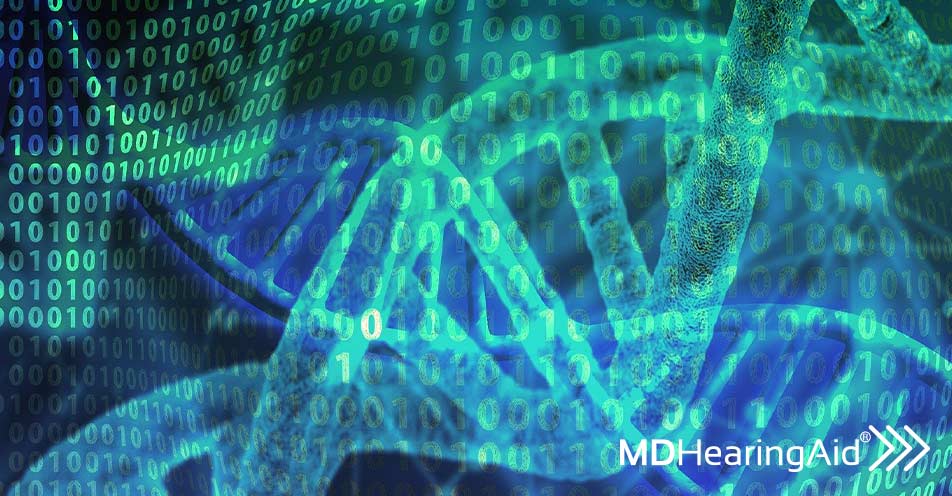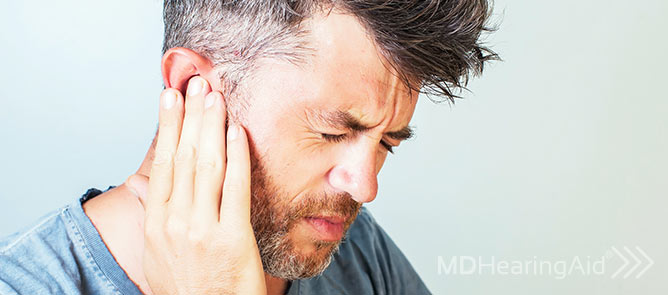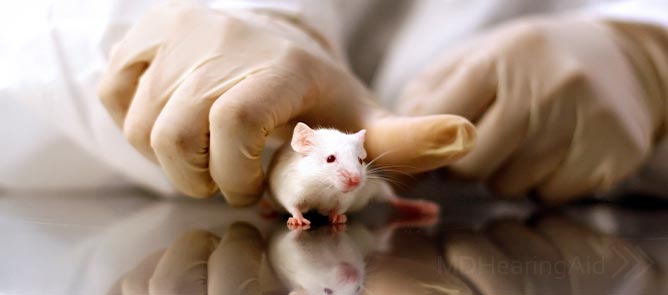If you’re struggling to understand your loved ones at dinner, you don’t need science to tell you about the psychological difficulties of hearing loss. But just in case you need a reminder, research shows that people with hearing loss commonly experience “loneliness, depression, distress, anxiety, somatization, and decreased social functions.”
Considering these challenges, looking for a cure is understandable – and we all know that hearing aids are the “go-to” treatment – but is there a way to actually reverse hearing loss?
In this article, we’ll explore your options. First, we’ll tell you what doctors say about different types of hearing loss – and whether it's permanent and reversible. Then we’ll move into the “experimental” realm – with the latest genetic research that’s flipping what we know about hearing loss on its head.
Use these links to navigate the article:
- Reversing Hearing Loss: What Do Doctors Say?
- Reversing Hearing Loss: The Latest Scientific Discoveries
Reversing Hearing Loss: What Do Doctors Say?
Let’s start with the good news: Many types of hearing loss are reversible. The bad news is, you’re probably suffering from the kind that’s not reversible. Below we’ll review the different kinds of hearing loss and whether doctors believe they’re permanent:
Age-Related and Noise-Induced Hearing Loss (Permanent)
Age-related hearing loss happens to many of us as we grow older, and long-term exposure to loud noise can exacerbate the problem. Most people with difficulty hearing suffer from a mix of age-related and noise-induced hearing loss – and it’s difficult to know which is the primary cause.
These conditions can happen to anyone, regardless of noise exposure, medical conditions, and medications – and both are related to damaged hair cells in your ears. These hair cells detect sound vibrations, and they’re essential to hearing.
Unfortunately, once hair cells are damaged, the resulting hearing loss is permanent. According to doctors, damaged hair cells can’t heal or regenerate. From the World Health Organization (WHO):
Age-related hearing loss cannot be reversed, as it is caused by the degeneration of sensory cells, which occurs with age. However, it can be treated effectively by the use of hearing aids and other communication devices.
Hearing Loss From Ear Infection (Usually Not Permanent)
Have you ever had a cold or flu go deep into your ears, or suffered from allergy-related ear infections? When fluid builds up in your middle ear, it becomes a breeding ground for infection. The result is painful ears, pressure, congestion, and in some cases, the loss of hearing – as if someone stuffed cotton balls in your ears.
If an ear infection doesn’t heal by itself, your doctor will usually prescribe antibiotics. If it’s a chronic condition, doctors may install ear tubes to keep your middle ear open and dry.
In most cases, hearing loss from an ear infection reverses and heals after the infection goes away. However, severe cases of infection can lead to permanent hearing damage. Always visit a doctor at the first signs of infection.
Hearing Loss From Earwax (Not Permanent)
Not only does earwax protect your ears from dust and debris, but it is a good thing and very normal. It is for this reason that you should never use cotton swabs to clean your ears. Using cotton swabs can cause you to jam earwax deep into your ear, resulting in infection and temporary hearing loss. In fact, never put anything in your ear canal, as this can be painful and lead to infections.
Hearing loss from too much earwax is not permanent. Your doctor can flush out earwax build-up painlessly. If that’s the only problem with your hearing, you might reverse your hearing loss in a single office visit. Unfortunately, patients with age-related and noise-induced hearing loss may find that earwax was only a small part of their problem.
Sudden Onset Hearing Loss (Often Not Permanent)
Sudden sensorineural hearing loss (SSHL) is commonly called “sudden onset hearing loss” or “sudden deafness.” SSHL involves the rapid loss of hearing – usually in one ear – either instantly or over the course of several days. According to the National Institute on Deafness (NIDCD):
Experts estimate that SSHL strikes between one and six people per 5,000 every year, but the actual number of new SSHL cases each year could be much higher because SSHL often goes undiagnosed. SSHL can happen to people at any age, but most often affects adults in their late 40s and early 50s.
In many cases, SSHL is reversible when treated swiftly. However, the NIDCD confirms that the longer an SSHL patient goes untreated, the more likely hearing loss will be permanent:
Treatment that is delayed for more than two to four weeks is less likely to reverse or reduce permanent hearing loss.
If you have symptoms of SSHL, go to the doctor immediately. Your hearing depends on it.
As an important aside, other forms of hearing loss could appear with similar symptoms to SSHL. These include hearing loss related to an autoimmune disorder, drug use, a cholesteatoma, and even an acoustic neuroma. Although these types of hearing loss could appear similar to SSHL, they will have varying degrees of restoration ability depending on the case. This is yet another reason to always visit a doctor as soon as you notice any signs of hearing loss.
Reversing Hearing Loss: The Latest Scientific Discoveries
So far, we’ve discussed what doctors say about reversing hearing loss. Basically, your condition is not reversible if you suffer from age-related or noise-induced hearing loss caused by hair cell damage. While this is true – according to the limits of modern medical science – recent medical research offers a ray of hope.
Let’s look at what the latest scientific discoveries have shown us about reversing hearing loss caused by hair cell damage:
Harvard Scientists Regenerate Inner-Ear Hair Cells (in Mice)
Harvard Medical School reports that scientists might have discovered a way to stimulate hair cell regeneration in mature human ears. Thus far, researchers have only conducted their experiments on mice, but Harvard Medical School claims:
They were able to reprogram the inner ear’s cells to proliferate and regenerate hair cell-like cells in adult mice. This proof-of-concept study, and first of its kind, may provide an approach to the regeneration of sensory hair cells and other important inner-ear cell types in people with hearing loss.
Previously, researchers could only induce hair cells to divide and regenerate in the ears of newborn mice. Experiments on mature mice were unsuccessful. Since human ear hair cells are fully mature at birth, scientists were not sure if they could “reprogram” human ear cells to regenerate.
This changed when Harvard researchers successfully used gene therapy on mature mice. The therapy regenerates “early inner-ear developmental genes so that the mature inner ear regains neonatal properties, which enables them to re-divide and regenerate.” According to the author of the study, Zheng-Yi Chen, “This paper is the first to show that, by reprogramming, mature mammalian inner-ear cells can be induced to divide and become hair cells, which are needed for hearing.”
Chen claims that his findings lay the foundation for hair cell regeneration in humans. If Chen is right, doctors might be able to develop successful treatments to reverse age-related and noise-induced hearing loss in the not-too-distant future.
Stanford Research Into the Genetics of Hearing Loss
Stanford University is also researching the genetic aspects of hearing loss. Scientists at the university have found that nearly all hearing loss conditions have a noteworthy genetic component – and they suspect that several hundred genes may come into play depending on the type of hearing loss condition. So far, they’ve identified half of these genes.
Stanford is continuing its research with a team of dedicated scientists. Their goal is to discover more genes involved in hearing loss and to create a test that measures an individual’s propensity for hearing loss. One day, Stanford’s research could play an important role in developing therapeutic treatments for reversing hearing loss.
Brain Exercises Could Reverse Some Hearing Loss Symptoms
Although hair cell damage is currently irreversible, another contributing factor to hearing loss can relate to the brain's processing abilities. If the brain is starved of auditory signals from the ear, there is evidence to show that the brain can rewire itself and use its processing powers in other areas. Therefore, it is extremely important for the brain's auditory cortex to be continually stimulated with speech signals to help maintain its ability to comprehend speech, especially in noise. One expression commonly used by hearing care professionals is “use it or lose it.” For these reasons, the earlier you seek help for your hearing loss, the better.
Most hearing loss patients notice a loss of speech comprehension when trying to listen to speech in a noisy environment.
Brain exercises to help keep the auditory cortex stimulated and improve speech comprehension will not regrow your ear hair cells – but they could improve some of the effects of hearing loss. A smartphone app from Lace Listening includes listening comprehension exercises for boosting your brain’s ability to comprehend speech in noisy environments. According to Lace, the app “assists in developing listening and communication skills and strategies that will help compensate for those situations when hearing is inadequate.” They also claim it will improve your ability to understand speech in noise by up to 30%, and if you have hearing aids, it will help you get the most out of them. The sooner you start wearing hearing aids the sooner you can start helping the brain to understand speech.
Hearing Aids Are the Best Solution We Have for Hearing Loss Right Now
Perhaps in the not-too-distant future, treatments for hearing loss won’t be that different from going to the eye doctor for laser eye surgery. In the meantime, we must listen to the advice of doctors and audiologists: Hearing aids are the best way to treat a permanent hearing loss condition.
If you’re considering hearing aids, but you don’t want to spend thousands of dollars, MDHearing has the solution:
- High-quality, affordable, FDA-registered hearing aids
- Medical-grade digital hearing aid technology
- Prices ranging from just $399.99 to $1199.99 per pair
- Built by audiologists and engineers to fit 80% of hearing loss conditions
- Order from home without a single office appointment
- Rechargeable hearing aids available
- Personalized, hearing aid set-up assistance with a phone specialist
- 100% money-back satisfaction guarantee
While science is flipping what we know about hearing loss on its head, MDHearing is flipping what you know about the cost of hearing aids on its head. We firmly believe that effective, high-quality hearing aids do not need to cost thousands of dollars.
Wondering if you have hearing loss? Take our quick and easy online hearing test and get your results instantly.
TAKE ONLINE HEARING TEST


